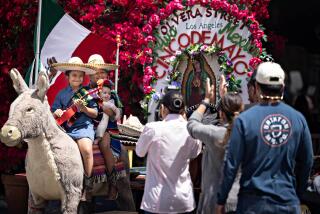Glendale ‘Santa’ Requests End to Order Limiting House Visits
Glendale’s self-styled Santa Claus has asked to be released from a court order he signed last month curtailing his efforts to make his home a year-round “Santa’s Dream House.”
With a new attorney on his case, Robert George filed motions last week in Glendale Superior Court asking a judge to vacate the order, which prohibits him from advertising his rented home in eastern Glendale as “Santa’s residence” or letting the public visit it.
The new attorney, Clifford N. Barry, argued in a motion that the Nov. 18 injunction was legally incorrect because it took away “inalienable” constitutional rights.
Pressured, Misinformed
In a declaration filed last Thursday, George said he was pressured and misinformed when he signed the order to settle a lawsuit brought against him by the city. George said his former attorney, who was handling the case for free, told him that he did not have time to go through a trial. George said he could not afford to hire an attorney to try his case, and he said he was not told that by signing the order he might be waiving any constitutional rights.
Barry, who is also representing George for free, said he learned about the case through media coverage and decided to defend George. Barry said he is prepared to take the case to trial and appeal a verdict, if necessary.
Glendale Senior Assistant City Atty. Scott H. Howard said the new action is a frivolous attempt by George to get more media attention and delay resolution of the case.
Howard said the city’s action was designed solely to prevent George from conducting a commercial operation in a residential neighborhood. The agreement, he said, was a compromise worked out by all parties after a three-hour discussion with a judge.
“We allowed him to keep up most of his decorations,” Howard said. “I think I had enough evidence to close him down.”
The order concluded a zoning enforcement action brought against George early this year in response to complaints from neighbors about the year-round Christmas activities at the house on Alameda Street.
The order allows George to keep up an estimated 50,000 to 70,000 lights inside and outside his house but prohibits him from adding more or turning on those visible from the outside except from Nov. 24 to Jan. 6 each year.
It also prohibits George from accepting donations or selling Christmas items, from distributing literature in which his house is described as Santa’s Dream House or North Pole and from describing the house in public or private as Santa’s residence or the “location of ‘Santa Claus.’ ”
As a concession to George’s goal of making his house a year-round “North Pole,” the order allows him to receive two visits each month from terminally ill children who want to see Santa before they die. George told court officials he received five such visits during the last year, Howard said.
Other than terminally ill children, the order prohibits any “member of the public” from being on the property, with the exception of relatives, “bona fide personal friends,” public employees, deliverymen and public utility personnel.
“It looks like I’m not allowed to go on his property,” Barry said. “To me, it looks like somebody extorted somebody else of their civil rights.”
In a brief filed Thursday, Barry argued that the order infringed on George’s constitutional rights to freedom of speech and association. Barry said Judge Joseph R. Kalin erred in approving the order, even though George agreed to sign it.
“The judge had an obligation to look at this and say, ‘These are rights I cannot take away,’ ” Barry said.
A hearing has been scheduled for Dec. 18 on the new motion.
More to Read
Sign up for Essential California
The most important California stories and recommendations in your inbox every morning.
You may occasionally receive promotional content from the Los Angeles Times.










